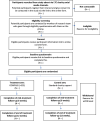Clinical efficacy of COMPASS, a digital cognitive-behavioural therapy programme for treating anxiety and depression in patients with long-term physical health conditions: a protocol for randomised controlled trial
- PMID: 34697123
- PMCID: PMC8557248
- DOI: 10.1136/bmjopen-2021-053971
Clinical efficacy of COMPASS, a digital cognitive-behavioural therapy programme for treating anxiety and depression in patients with long-term physical health conditions: a protocol for randomised controlled trial
Abstract
Introduction: Approximately 30% of people with long-term physical health conditions (LTCs) experience mental health problems, with negative consequences and costs for individuals and healthcare services. Access to psychological treatment is scarce and, when available, often focuses on treating primary mental health problems rather than illness-related anxiety/depression. The aim of this study is to evaluate the clinical efficacy of a newly developed, therapist-supported, digital cognitive-behavioural treatment (COMPASS) for reducing LTC-related psychological distress (anxiety/depression), compared with standard charity support (SCS).
Methods and analysis: A two-arm, parallel-group randomised controlled trial (1:1 ratio) with nested qualitative study will be conducted. Two-hundred adults with LTC-related anxiety and depression will be recruited through national LTC charities. They will be randomly allocated to receive COMPASS or SCS only. An independent administrator will use Qualtrics randomiser for treatment allocation, to ensure allocation concealment. Participants will access treatment from home over 10 weeks. The COMPASS group will have access to the digital programme and six therapist contacts: one welcome message and five fortnightly phone calls. Data will be collected online at baseline, 6 weeks and 12 weeks post-randomisation for primary outcome (Patient Health Questionnaire Anxiety and Depression Scale) and secondary outcomes (anxiety, depression, daily functioning, COVID-19-related distress, illness-related distress, quality of life, knowledge and confidence for illness self-management, symptom severity and improvement). Analyses will be conducted following the intention-to-treat principle by a data analyst blinded to treatment allocation. A purposively sampled group of COMPASS participants and therapists will be interviewed. Interviews will be thematically analysed.
Ethics and dissemination: The study is approved by King's College London's Psychiatry, Nursing and Midwifery Research Ethics Subcommittee (reference: LRS-19/20-20347). All participants will provide informed consent to take part if eligible. Findings will be published in peer-reviewed journals and presented at conferences.
Trial registration number: NCT04535778.
Keywords: anxiety disorders; clinical trials; depression & mood disorders.
© Author(s) (or their employer(s)) 2021. Re-use permitted under CC BY-NC. No commercial re-use. See rights and permissions. Published by BMJ.
Conflict of interest statement
Competing interests: None declared.
Figures


References
-
- Naylor C, Parsonage M, McDaid D, et al. Long-Term conditions and mental health: the cost of co-morbidities, 2012. Available: https://www.kingsfund.org.uk/sites/default/files/field/field_publication...
-
- Naylor C, Das P, Ross S, et al. Bringing together physical and mental health. King’s Fund, 2016. Available: http://www.kingsfund.org.uk/sites/files/kf/field/field_publication_file/... - PMC - PubMed
Publication types
MeSH terms
Associated data
LinkOut - more resources
Full Text Sources
Medical
